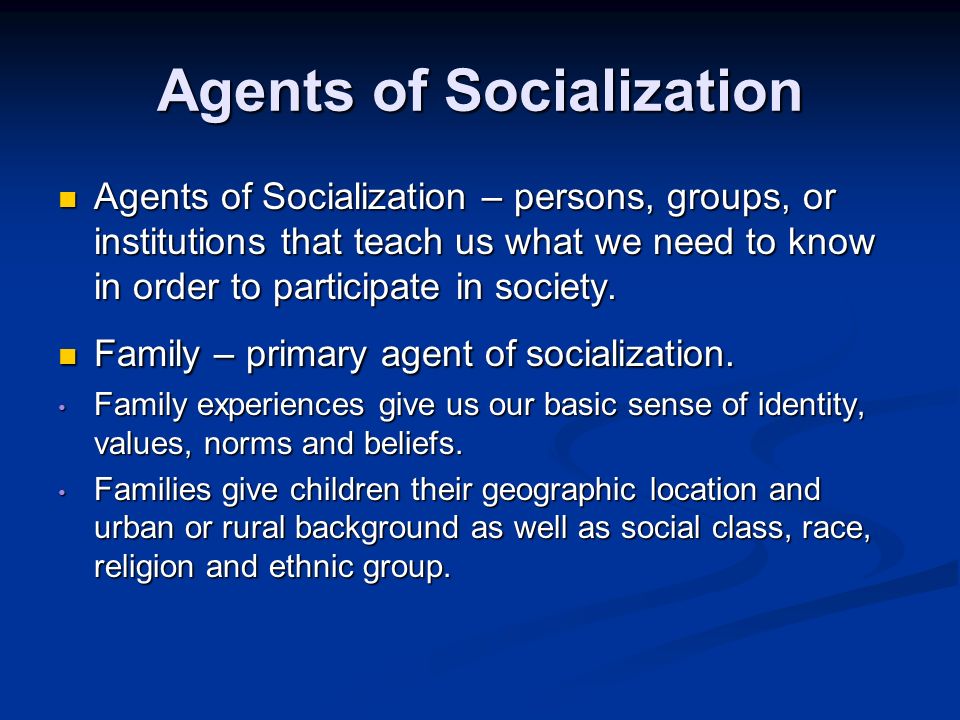Imagine a newborn baby. Tiny, with bright, curious eyes. This little human, a blank slate, is ripe with potential. Yet, they are far from ready to navigate the complex world around them. This is where the process of socialization begins – the journey where a child, and indeed every individual, learns to become a functioning member of society. But who are the teachers in this lifelong classroom?

Image: helpfulprofessor.com
The answer lies in the agents of socialization, the people, institutions, and forces that shape our values, beliefs, and behaviors. These agents are the architects of our social selves, molding us into the people we become. Today, we’ll explore four of the most crucial agents of socialization: family, school, peers, and mass media.
The Foundation: Family
The family unit, the first and often most enduring influence, lays the groundwork for a child’s social development. Think of the family as a primary incubator, a safe space where values, beliefs, and norms are absorbed like a sponge soaking up water. From the earliest moments, a child’s development is influenced by their family’s traditions, customs, and attitudes.
The family teaches a child about communication, problem-solving, and emotional regulation. It’s where they learn about love, empathy, and respect, the essential building blocks of a healthy society. Some families are incredibly close knit, sharing every meal, every holiday, every moment, while others are more distant, with less frequent interactions. Regardless of the family model, all family members have a profound impact on the individual’s social development.
It’s important to acknowledge the diversity of family structures today. Not every family consists of the traditional nuclear model of a married couple and children. Single-parent families, blended families, and same-sex families all play a significant role in shaping their members. This diversity enriches our understanding of socialization and reminds us that the family is a powerful agent, regardless of its configuration.
The Classroom: School
While family lays the foundation, school takes the reins, expanding the realm of socialization. School isn’t just about academics; it’s a microcosm of society, a training ground for social interaction, and a place where rules, structure, and conformity are emphasized.
Think of the classroom as a stage where children learn to navigate different social groups, developing skills in cooperation, competition, and negotiation. From organized playtime to group projects, students learn to function within established structures, following instructions, respecting authority, and interacting with peers.
School also introduces formal curricula that impart knowledge about history, geography, science, and the arts, shaping a child’s understanding of the world and their place in it. It’s a place where students develop a sense of citizenship and responsibility, learning about their rights and obligations as members of a community.
The Playground and Beyond: Peers
The influence of peers takes shape in the bustling playgrounds, vibrant dorms, and lively gatherings where friendships are forged and identities are shaped. This realm of socialization is less structured, more spontaneous. Peer groups act as a mirror, reflecting back our choices, our values, and our sense of belonging.
Think of it like this: We want to fit in, to be accepted, to feel like we belong. This desire drives us to conform, to embrace the norms and trends of the groups we associate with. Peer pressure can be both positive and negative. It can encourage us to try new things, to speak up, to embrace new ideas, or it can push us towards risky behaviors, unhealthy habits, or conformity at the expense of our own values.
The influence of peers on our development is undeniable, impacting everything from our fashion choices and musical tastes to our career aspirations and even our romantic relationships.

Image: fernanda-has-salazar.blogspot.com
The World in Your Hands: Mass Media
The advent of mass media, encompassing television, movies, social media, and the internet, has fundamentally altered the landscape of socialization. The impact of mass media goes beyond mere entertainment; it shapes our perceptions of the world, our values, and even our aspirations.
Think of the images, narratives, and messages that flood our screens and feeds. These messages, often subtle but powerful, influence our understanding of gender roles, racial stereotypes, consumerism, and notions of success.
Mass media can be a powerful tool for raising awareness of important social issues, but it can also perpetuate harmful stereotypes and unrealistic expectations. It’s crucial to be discerning consumers of media, questioning the messages we receive and engaging with a critical lens.
Navigating the Agents: Building Your Own Path
Understanding the agents of socialization is essential to understanding ourselves and our place in the world. These agents, while shaping our development, also equip us with the tools we need to navigate complex social environments.
By recognizing the influence of family, school, peers, and mass media, we gain a deeper understanding of our own values, beliefs, and behaviors. This awareness allows us to make informed choices, to challenge societal norms when necessary, and to build our own unique paths.
What Are The 4 Main Agents Of Socialization
Moving Forward: Embracing Socialization
The agents of socialization are a constant in our lives. They are the forces that shape us, mold us, and help us grow. While they shape our perceptions of the world, it’s ultimately up to us to navigate their influence and develop our own unique identities.
The journey of socialization is lifelong, a continuous process of learning, adapting, and evolving. By embracing this process, by challenging ourselves and engaging with the world around us, we can become the best versions of ourselves, contributing to a more just and equitable society.






